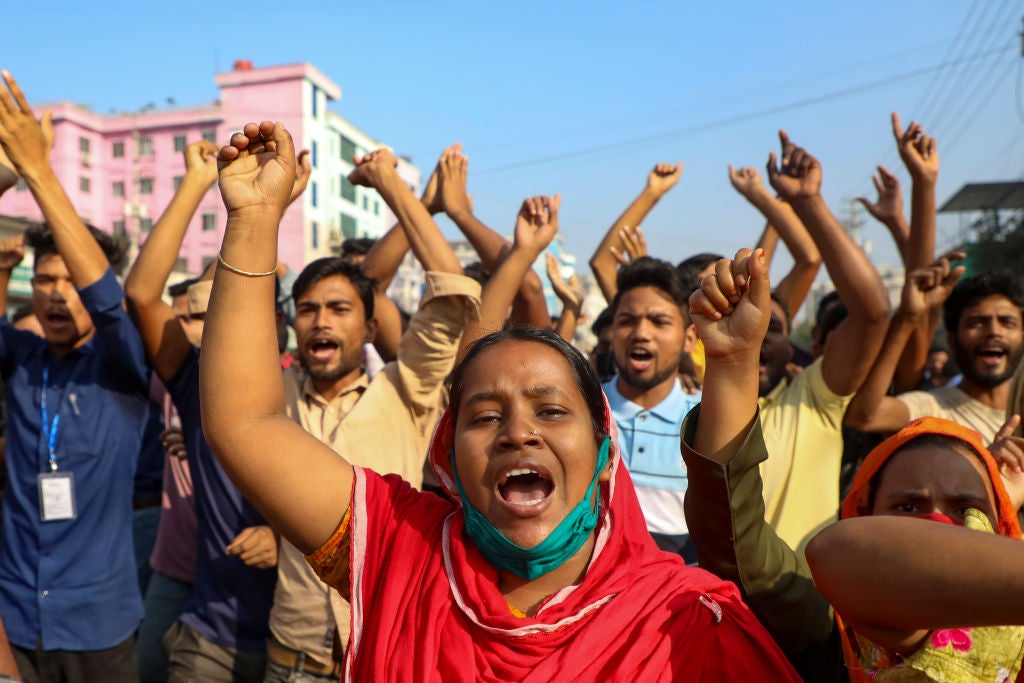
Representative Ilhan Omar, along with representatives Jim McGovern and Jan Schakowsky wrote to AAFA asking the organisation and US fashion brands to support fairer wages and protect labour rights in Bangladesh.
The letter is co-signed by fellow Democrat members of congress Raúl Grijalva, Barbara Lee, Alexandria Ocasio-Cortez, David Trone, and Susan Wild.
Alongside the demand for better wages, the letter also calls for an end to the “violence perpetrated by police and other security forces” against Bangladeshi workers and asked brands to call on authorities to stop arresting union leaders in response to protests and release detained individuals.
The representatives also call for transparency and accountability in supply chains, to help safeguard labour and human rights, including the right to freedom of association in Bangladesh.
Fashion brands are also asked to warn suppliers to stop filing criminal cases against workers and make it clear that dismissal, blacklisting or harassment of workers and union representatives is unacceptable, using their considerable leverage.
The letter states: “As you know, the recent wage increases announced by Bangladesh’s wage board, which would not even meet the rising cost of living, have led to extended mass protests. Police have responded with violence against protesters and trade union leaders, resulting in at least four deaths, numerous injuries, and a wave of unjust arrests, detentions, and indefinite factory shutdowns.”
Recent negotiations between factory owners and worker representatives in Bangladesh have seen protests erupt in the country, with at least four workers killed in the resulting clashes.
The US lawmakers accuse factory owners and police in Bangladesh of responding to the protests with “intimidation and violence”.
The letter calls for US brands to use their influence and “stand together with workers” in the region by demanding better wages for Bangladeshi garment workers.
In November, it was announced that the minimum wage for garment workers in the country would increase to TK12,500 ($114) a month. This is a 56.25% rise on the previous minimum garment worker wage but is still substantially lower than the TK20,393 ($184.6) that worker representatives initially asked for.
In the letter, the lawmakers add: “We agree with the Biden administration’s call for the government of Bangladesh to respect and protect workers’ rights to organise, protest peacefully, and collectively bargain without fear of retaliation, violence, or intimidation.”
The letter is endorsed by Academics Stand Against Poverty, Asian Pacific American Labor Alliance (AFL-CIO Affiliate), IndustriALL Global Union, Institute for Policy Studies – Global Economy Project, Labour Behind the Label, Oxfam America, and Workers United (SEIU Affiliate).
The Clean Clothes Campaign has previously said Bangladesh garment workers have a right to protest following employers’ “meagre” minimum wage proposal and calls on global fashion brands to confirm their commitment to fair pricing.
The letter ends: “We urge you to help stop the exploitation against the Bangladeshi workers who have fueled the growth and profit of your businesses, and in support of the democratic, inclusive values that we cherish as a nation.”
AAFA told Just Style that it was pleased to see members of congress join its efforts in seeking improved working conditions in Bangladesh.
In a statement, AAFA’s senior vice president of policy Nate Herman said: “AAFA and our members have been at the forefront of efforts to secure real increases to wage levels and reforms to the process to make sure this structure gets updated annually – and recommend that this process is reviewed annually – so that Bangladeshi workers are not disadvantaged by changing macroeconomic conditions. As we and our members have continuously reiterated, we are committed to responsible purchasing practices to support the wage increases. Moreover, we continue to urge that the government of Bangladesh continues to partner with all parties to ensure an environment that fosters workers’ rights, worker welfare, and inclusive and peaceful multi-stakeholder dialogue.”
AAFA added that it condemned the violence that has accompanied the negotiations and protests in Bangladesh. Herman added: “We have continued to appeal to the government of Bangladesh, through its words and actions, including releasing anybody unlawfully detained, to set a tone that facilitates only peaceful discourse as wage and related issues are addressed and resolved.”
Herman concluded: “A responsible and competitive Bangladeshi apparel industry – one that involves peaceful and good faith participation from all stakeholders and that supports economic opportunity – continues to remain an important part of the global fashion industry.”
The Bangladesh Garment Manufacturers and Exporters Association (BGMEA) had not responded to Just Style’s request for comment at the time of going to press.



